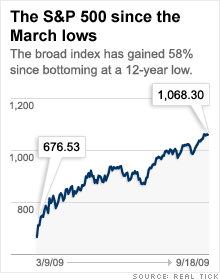Riding the bull a little longer
The momentum that boosted the Dow, S&P 500 and Nasdaq to nearly one-year highs looks to reassert itself in the week ahead. Fed meeting, housing reports, G-20 summit on tap.

NEW YORK (CNNMoney.com) -- With little on the docket to challenge investor optimism, the defiantly bullish stock market is looking to extend its staggering run in the week ahead.
And why not? Wall Street has shaken off pervasive calls for a September selloff and warnings about the still-struggling economy, managing frequent, fresh 2009 highs of late. The Dow Jones industrial average, the S&P 500 index and the Nasdaq composite have all ended higher in 9 of the last 11 sessions.
The petering out of certain government programs in the last two months of the year and the possibility that third-quarter financial reports will disappoint are real concerns -- so is the reality of a still-brutal job market and change in consumer attitudes toward spending versus saving. But these longer-term worries aren't likely to dominate in the week ahead.
"As long as the economic news keeps pointing up, the market is likely to post more gains in the near-term," said Michael Sheldon, chief market strategist at RDM Financial Group.
"However, given the rate of ascent in recent days, investors should be prepared for a pullback before too long," he said. "Anything that could disrupt the positive outlook could spell trouble."
Since bottoming at a 12-year low March 9, the S&P 500 has gained 58% and the Dow has gained 50%. Since bottoming at a six-year low, the Nasdaq has gained 68%.
The advance has been driven by extraordinary amounts of fiscal and monetary stimulus and a growing sense of optimism about the economy.
But that optimism may be misplaced, said Robert Loest, portfolio manager at Integrity Funds, and he said stocks could be in for a bigger selloff a few months out. "I don't think we've seen a rebound of this magnitude following a crash and I'm suspicious."
"This is not the time for investors to be getting into stocks but to be taking profits," he said. "I think this rally can go another five weeks or so, but not three months or six months."
The week ahead: The Federal Reserve meets Tuesday and Wednesday and is likely to hold interest rates steady. Last week, Fed chief Ben Bernanke said that the recession is "likely over," although the labor market has a way to go. The Fed's statement is likely to echo that observation.
Several housing market reports and the index of leading economic indicators are also on the docket this week. But the recent momentum is likely to keep nudging stocks higher.
Monday: The Conference Board's index of leading economic indicators is due in the morning. LEI is expected to have risen 0.7% in August after having risen 0.6% in July, according to a consensus of economists surveyed by Briefing.com.
Tuesday: The Federal Housing Finance Agency (FHFA) releases its July home price index after the start of trading. The index is expected to have risen 0.5% after rising 0.5% in June.
The Federal Reserve begins its two-day interest rate policy setting meeting with a decision expected Wednesday afternoon.
Wednesday: Treasury Secretary Timothy Geithner is set to testify before the House Financial Services committee on regulatory reform, starting at around 9:30 a.m. ET.
The Fed is widely expected to hold the fed funds rate, a key short-tem interest rate, at historic lows near zero on Wednesday, with an announcement due at 2:15 p.m. ET. But investors will be more focused on what the bankers say about their "exit strategy" as they seek to wind down programs that pumped trillions into the economy to cushion the blow of the recession.
The weekly crude oil inventories report is also due in the morning.
Thursday: The existing home sales report from the National Association of Realtors (NAR) is due shortly after the start of trading. August sales are expected to have risen to a 5.33 million unit annual rate from a 5.24 million unit rate in July. July sales were up 7.2% from the previous month, the largest monthly gain on record, going back to 1999.
The weekly jobless claims report from the Labor Department is due before the start of trading. 550,000 Americans are expected to have filed new claims for unemployment, versus 545,000 claims the week before. Continuing claims, a measure of people who have received benefits for a year or more, likely fell to 6.188 million from 6.230 million the week before.
Also Thursday, the G-20 summit in Pittsburgh gets underway. The Group of 20 leading developed and emerging countries will discuss the ongoing efforts to stabilize economies after the financial market meltdown.
Friday: Sales of new homes are expected to rise at a 440,000 unit annualized rate in August, according to forecasts, after rising at a surprisingly robust 433,000 unit annualized rate in July. The government report is due out after the start of trading.
The University of Michigan's September consumer sentiment index is due shortly after the start of trading. Sentiment is expected to have dipped to 70 from an initial read of 70.2.
Durable goods orders, or orders for long-lasting manufactured products, are expected to have risen 0.1% in August after rising 5.1% in July. The July jump resulted from a spike in aircraft orders. Orders excluding transportation are expected to have risen 0.8% in August after rising 1.1% in July. ![]()
Fortune 500's top stock: Freddie Mac
The hypocrisy of the Fed
There is life after Lehman
Ranking the rescues
Fighting off the Bear: Seven stories
5 lessons from the crash
50 Most Powerful Women
Bernanke: Fed's unlikely risk taker
100 Fastest-growing companies
50 years of profit swings


